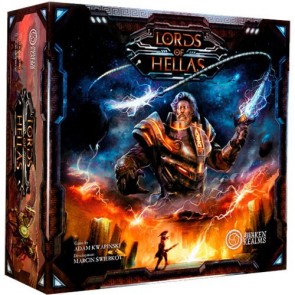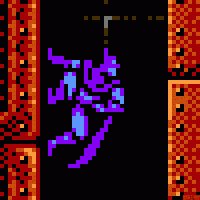And, lo, Moses came down from the mound and said “Bring me a hammer and chisel, my top 10 list has changed.”
To me, Lords of Hellas is a hanging curve ball, out over the plate with the wind at my back and sun in the pitcher's eyes. That is just a convoluted way of saying it is completely in my wheelhouse. Just reading about it and checking out the images online was enough to warrant a mention in My Woefully Incomplete and Wholly Inaccurate Best of 2018 Guide. A cyber-twist on Greek Gods with Heroes, Hunting and Hellas. I'm not sure I could assemble a better list of things I wanted in a board game. But a checklist of cool shit does not make a great game. Assembling them into a well-balanced, smooth-running tour de force, however, has Lords of Hellas bursting into my top games with aplomb.
The game begins with everyone selecting from the (slightly) asymmetrical heroes. While the hero you select can point you into a direction of which of the four victory conditions you might want to pursue, it doesn't constrict you from changing strategy on the fly. Three victory conditions are instantly recognizable as tried and true: Control a preset number of areas, have control of a number of areas containing temples or Hunt and Collect three different Monsters. The final (fourth) victory condition involves building huge monuments to the gods and acts as both an in-game timer and “round” reset mechanism. Player's turns consist of taking any number of regular actions (but only once for each type) and a single Special Action which is then unavailable until someone uses the monument action to “reset” the round.
Of the victory conditions Monster Hunting looks like the default easy win. Why bother amassing an army and slowly spreading them across the map when you can track and kill some cyberneticly enhanced version of mythological creatures?If you do choose to go the Monster Hunting route, you are not at a distinct disadvantage in the other victory conditions. This is because the combat cards used to battle monsters are the exact same combat cards that are used to battle other players. If you decide to pursue this route, LOH gives you enough combat cards that you aren't the proverbial sitting duck if another players decides to sweep though your territories and attempt to remove them from your control. It might seem like a minor detail but it is one that screams “Well thought out and properly balanced.”
Of course, if someone is obviously trying to pursue the Monster Hunter victory condition, you will want to “dissuade” them from doing that. Players don't have a direct way to interfere with another players pursuit of killing monsters but they do have the ability to come in and snipe a monster if a player fails to overcome it in the initial melee. One player can, for instance, get five of the six wounds needed to take down a specific mob but can still be vulnerable to a well-timed kill steal. Even if you aren't actively pursuing the Monster Hunter victory condition, it is still a potent weapon in your arsenal. Defeating a Monster gives you the control token for that region, so it can be a sly way to tip the scales in your favor in other victory conditions or you can use it to acquire new or different battle cards to use versus another player, since you draw battle cards when you take the "Hunt" action. A well timed kill steal followed by "Usurp" action can devastate the holdings of another player...or just the threat of it can change the tactics of the other players.
If Monster Hunting is deceptive on how you might think it will play out, so is Combat. Combat appears, on the surface to have little at stake. The loser of a battle has to remove one single hoplite and retreat from the region. It doesn't sound like a particularly devastating, army-routing result. But tossing combat cards into play can turn a single encounter upside down. The cards have powers you can activate but usually at a cost of sacrificing a hoplite. The red skull cards might help you win the battle, but can easily cause you to take a major hit in your overall war. The card playing portion of the combat starts with the defender. They have the option of playing a card or passing, then the attacker has the same option. Once you have passed, your plan is set...and if the other player continues to play cards, it can sway a battle you thought was a forgone conclusion.
I really enjoy how the game escalates. For instance, each area has a set number of hoplites that you need to have in that area in order to initially take control of it (think of it as “overcoming” the local population). Once an area has been conquered in this way, the requirement is removed. You can choose to leave a single hoplite to hold an area or even zero troops if you choose to attempt to blitzkrieg around the map. You can even choose to entrench troops inside of cites for a defensive bonus. The escalation comes in both the removal of the troop requirement needed to control an area as each is conquered and in using the Special Action: Recruit. This action gives you 2 hoplites in EACH region you control with a city (4 hoplites if that city...is...Sparta!). So, in the beginning rounds, it may only give you two hoplites but as the game progress you can plop down a bevy of troops on the map with this single action, swinging the dynamic of the entire continent.
You can also acquire god powers (secured by taking over the area containing that particular god's monument) and other cards that you can only be used one per round...but should you wait until the perfect moment and risk not using that power this round or pile them on, early and often? Timing is everything and you can rest assured the other players aren't taking what you want to do into account....or maybe they are and just want to prevent you from pulling it off.
The Build Monument is both an end-game timer and who's-going-to-blink first round timer. Since you do one special action per turn and you usually want to do ALL the special actions before the end of a “round” you have to try to judge when your opponents are going to build a piece of the monument. If you were unable to, say, Hunt a Monster this round, they have now pushed your plan one rung further down the ladder. Will you still have time to accomplish everything you want, since you can only Hunt once per round? Thinking “Well, I'm screwed!” a half dozen times during a game is not uncommon. But, just as often, you'll find enlightenment in pursuing a new, different courses of action. If the Monument action that is taken fully assembles the first Monument of the game, a 3 round clock begins. The player who took the action takes the Monument activation card, and covers it’s 3 spaces with 3 of their used action tokens. On each of their turns after that, the player takes a token off the card when they do their Special Action. Whoever controls that monument’s space when the last token in removed wins the game. But don't forget the other win conditions are still valid, and can end the game before the 3-turn clock.
I've been kicking around an (admittedly horrible) comparison of Lords of Hellas with Scythe. Bear with me for a moment while I try to justify what I mean. When trying to explain the immense popularity of Scythe, I came to the conclusion that much of it has to do with giving you a small taste of a variety of excellent mechanisms wrapped up into a stunningly attractive package...a sampler platter of things you might dig. Lords of Hellas does something similar except where Scythe bait and switched conflict, Lords of Hellas leaned into it. And you don't have to do a bit of everything to win a game of LOH, you can just choose a primary focus. This isn't a sampler platter, this is a all-you-can-eat buffet of top-tier Dudes on a Map strategies and execution. The monument victory method owes at least a nod to Cthulhu Wars' Doom Point system. The Madagot holy trilogy of Kemet, Cyclades, and Inis all provide tasty bits to this buffet. The Monster Hunting pulls from the likes of Champions of Midgard and Eric Lang's Rising Blood Sun Chaos in the Rage World are also obvious influences. And the thing is that Lords of Hellas comes out favorably on each of these comparisons. It may not match some of these games stride for stride but they certainly used what they learned from them to create a top-tier experience.
Lords of Hellas is equal parts playing your own strategy and carefully watching the other combatants for anyone making a move. It's strikes a good balance, never falling into the tedious “Got to stop that dude doing the Loki Strategy!” territory. There is plenty that I haven't even begun to delve into in this review, including priests, temples, and Monsters moving, attacking players, and even evolving. Suffice to say that these mechanisms are just as refined and well thought out as those I have gushed about. Lords of Hellas is a legitimate contender, not only in the crowded Dudes on a Map field but also in my favorite games of all time.
 Games
Games How to resolve AdBlock issue?
How to resolve AdBlock issue? 































